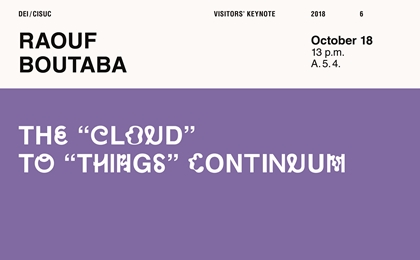
Visitors' Keynote - Raouf Boutaba

October 18 at 13h (sharp)
Room A.5.4 DEI-FCTUC
Invited Speaker: Raouf Boutaba
Title: The “Cloud” to “Things” Continuum
Abstract: Back in 2011, we introduced the concept of a multi-tier cloud as part of the “Smart Applications on Virtualized Infrastructure (SAVI)” NSERC Strategic Network Project. SAVI extends the traditional cloud computing environment into a two-tier cloud including smart edges – small to moderate size data centers located close to the end-users (e.g., service provider premises), and massive scale data centers with abundant high-performance computing resources typically located in remote areas.
We designed the smart edge as a converged infrastructure that uses virtualization, cloud computing and network softwarization principles to support multiple network protocols, customizable network services, and high-bandwidth low latency applications. Since then the concept of a multi-tier cloud has been widely adopted by telecom operators and in initiatives such as the Mobile Edge Computing (MEC). In the meantime, the advent of the Internet of Things (IoT) has seen an explosive growth in the number of connected devices generating a large variety of data in high volumes at high velocities. The unique set of requirements posed by the IoT data demands innovation in the information infrastructure with the objective of minimizing latency and conserving bandwidth resources.
The multi-tier cloud computing model proposed in SAVI falls short in addressing the needs of the IoT applications, since, most voluminous, heterogeneous and short-lived data will have to be processed and analyzed closer to IoT devices generating the data. Therefore, it is imperative that the future information infrastructure incorporates more tiers (e.g., IoT gateways, customer premise equipments) into the multi-tier cloud to enable true at-scale end-to-end application orchestration. In this talk, we will discuss the research challenges in realizing the future information infrastructure that should be massively distributed to achieve scalability; highly interoperable for seamless interaction between different enabling technologies; highly flexible for collecting, fusing, mining, and processing IoT data; and easily programmable for service orchestration and application-enablement.
Short-bio: Raouf Boutaba is a Professor of Computer Science and Associate Dean Research of the faculty of Mathematics at the University of Waterloo. He holds a University of Waterloo Research Chair and an INRIA International Research Chair. He is the founding Editor in Chief of the IEEE Transactions on Network and Service Management (2007-2010), and is currently the Editor in Chief of the IEEE Journal on Selected Areas in Communications. He served as the general or technical program chair for a number of international conferences including IM, NOMS and CNSM. His research interests are in the areas of network and service management. He has published extensively in these areas and received several journal and conference Best Paper Awards such as the IEEE 2008 Fred W. Ellersick Prize Paper Award. He also received other recognitions, including the Premier's Research Excellence Award, Industry research excellence Awards, fellowships of the Faculty of Mathematics, of the David R. Cheriton School of Computer Science and outstanding performance awards at the University of Waterloo. He has also received the IEEE Communications Society Hal Sobol Award and the IFIP Silver Core in 2007, the IEEE Communications Society Joe LociCero and the Dan Stokesbury awards in 2009, the Salah Aidarous award in 2012, the McNaugthon Gold Medal in 2014, the Technical Achievement Award of the IEEE Technical Committee on Information Infrastructure and Networking as well as the Donald W. McLellan Meritorious Service Award in 2016. He served as a distinguished lecturer for the IEEE Computer and Communications Societies. He is fellow of the IEEE, a fellow of the Engineering Institute of Canada and a fellow of the Canadian Academy of Engineering.